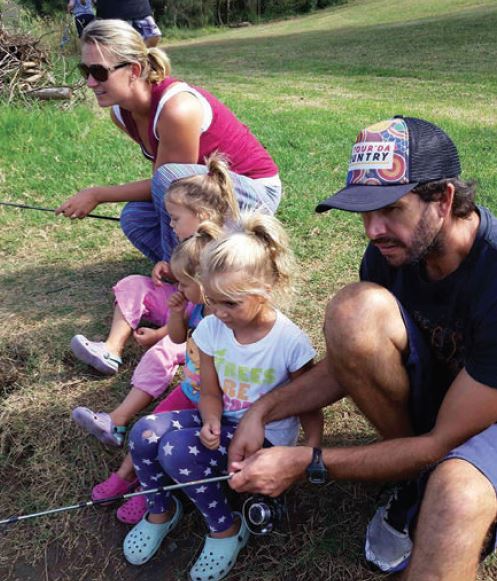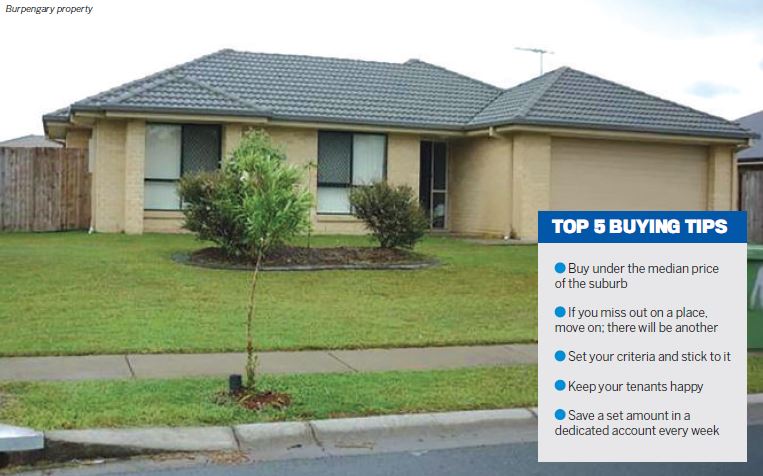As a young girl, Katrina Venables saw how brutal buying into the property market could be for a struggling family.
“I saw my parents both working their butts off to pay off our family home. Dad was in the coal mines and mum was a cleaner,” she explains.
“They are finally retired and both have chronic health problems, which means they aren’t living their retirement in the active/travelling style that they dreamt of. And that house never got paid off.”
After starting her own family, Katrina was set to go down the same path as she and husband Shane began saving up for their own house. Before long, they realised they would need far more money to make a deposit than they had expected.
“My husband and I both work part-time and we have three kids aged under six. We both share the load of work and caring for the house and the kids, whilst renting a modest three-bedroom house for $440 per week,” Katrina says.
“Like anyone living with a commute to Sydney, we couldn’t afford [to buy] anything on our part-time wages working in health and education. So we looked into investing in property whilst continuing to rent.”
Remembering her parents’ struggle, she decided that she didn’t want to go through the same ordeal they did – slaving to pay off a house in the best years of her life, and in the process risking her own health as well as time with her family.
The revelation
To better understand the property market relative to their situation, Katrina and Shane began to study up on property investing by subscribing to magazines, reading books and blogs, attending seminars and getting advice from other investors.
“One night we had a financial consultant come to our house to discuss how we could better spend
our savings and our super. Once he realised we were probably not in the most amazing financial position to be a part of his clientele with [our] quite low superannuation and savings balances, he gave us some personal insight into his property investment journey. He stayed until 11pm giving us a rundown on how property investing actually worked,” Katrina explains.
“I vividly remember him saying, ‘If you were to buy this house you are living in now, it would cost you $800,000. That’s repayments of $1,000 per week. You get to live here for $400 a week.
“I vividly remember him saying, ‘If you were to buy the house you are living in now, it would cost you $800,000. That’s repayments of $1,000 per week. You get to live here for $400 a week renting. Why would you want to buy your own house?”
Why would you want to buy your own house, seriously?’ ”This fateful visit set off a light bulb in Katrina and Shane’s heads, and the couple was sold on the concept of rentvesting, which involves choosing to rent a dwelling in your preferred neighbourhood while investing in a different property somewhere more affordable.
“We knuckled down and saved; $500 went out of our account into our savings account every week no matter what!”
“We knuckled down and saved; $500 went out of our account into our savings account every week no matter what! We committed to the goal of rentvesting and learnt to go without. After two years, we had $50,000,” Katrina says.
By setting aside that weekly amount, she estimates that they will be able to squirrel away around $25,000 per year in savings every year – the equivalent of a deposit for a property every couple of years.
“It just makes sense to us to rentvest. We could continue living happily in the suburb we love, [and be] close to great schools, parks and the beach. At $440 per week, it’s a steal for the area. And we can save the money we would be paying if we had a mortgage, and buy properties with that,” Katrina explains.

Katrina admits that most of the couple’s friends thought they were making the wrong move by choosing not to purchase their own home and to continue paying a landlord.
“[They say] ‘Oh, you’re only renting’, like we’re poor. And I guess we sort of are poor, compared to a lot of friends, when it comes to net income. We understand that we can’t afford properties close to major cities that will last 30 years without too much maintenance.”
To help them find the right first property to invest in, given their limited combined income of just $80,000, Katrina and Shane initially sought help from a third party.
“They were like a buyer’s agent but got their money through the developer if they sold a property to us. The woman who owned the company was extremely convincing and had an excellent sales pitch. I gave them our brief for a property and on two occasions we signed for a new-build property, only to find out it didn’t fill our brief.”
While the couple did their best to trust the agent’s expert advice, her lack of belief in their formula and criteria was a concern. In the end, their commitment to their vision won out and they chose to proceed without using a third party.
“The two properties just didn’t feel right. And really, I can’t help but feel that a company that gets a commission from the developer doesn’t have the buyer’s best interest in mind,” Katrina says.
“I think my biggest lesson is to believe in yourself if you are well educated. We really have invested a lot of time into educating ourselves on property investment, and just needed to trust in our formula.”
Following their experience with the buyer’s agent, Katrina tried taking matters into her own hands.
“I put in an offer at our maximum amount in a suburb that scored very well on a website as a ‘hotspot’. I almost got this property but was outbid by $1,000. I’m so glad I missed out, as six months on the suburb is way oversupplied due to a new estate that is being bought out by investors,” Katrina says.
“I knew the estate was going in, but I dismissed it and just focused on the current boomscore. It was a volatile suburb and I didn’t stick with my criteria but rather got caught up in the fact that one website told me it was about to ‘boom’.”
This near-disaster reminded Katrina of the importance of thorough research when investing in property, which eventually led the couple to Brisbane – regarded in 2016 as one of the fastest-growing corridors in the country.

With guidance from OpenCorp director Cam McLellan’s book, My Four-Year-Old The Property Investor, Katrina and Shane decided to work with a recommended mortgage broker who secured them a 92% loan with an 8% deposit. Even though they had to pay lenders mortgage insurance, the couple was on board.
“After a week or so, we found a seven-year-old house on a 750sqm block in a suburb called Burpengary, 30km north of the Brisbane CBD. It met all our criteria – close to transport and schools, 10km from the new North Lakes satellite city, and only 24% of the suburb [was composed of] rental properties,” Katrina says.
“All the numbers added up too. It was under the median for the suburb, plus there were tenants in place paying $395 per week.”
Katrina and Shane were able to get the property for $388,000 after negotiating down the original asking price of $400,000. They also had to pay stamp duty, solicitor fees, and for building reports and other costs, but in general they considered the post-purchase experience to be smooth. Katrina also found setting up a depreciation schedule for tax time to be useful.
Now that the Burpengary property has been settled, Katrina is focusing on cultivating good relationships with her tenants and managing agency.
“We are committed to buying the best property we can on our budget … with the intention of never selling”
“The tenants have just signed another 12-month lease, and they were sent wine and chocolates for their patience during the sale of the property,” she says.While the couple have finally found the perfect anchor property for their budget, Katrina admits that she and Shane could stretch their budget further if they both added another workday to their schedule. This move alone would allow them to save a further $20,000 each year, boosting their deposit and increasing their borrowing capacity.
However, their number one priority is their daughters – Molly, Bonny and Daisy – so they’re content to work fewer hours and earn less money until their kids are all at school.
Work smarter, not harder
With a solid long-term strategy that will see them hold on to their investment for the long term, the couple is now saving up again for their next investment. They are looking into buying one additional property every two years before riding the wave of rental income into retirement.
“Our goal is to retire in our mid-50s and live off the rental income so we can continue to enjoy renting and time with our kids and each other. We are committed to buying the best property we can on our budget and sitting tight with steady growth for the next 25–30 years, with the intention of never selling,” Katrina explains.
In hunting for property number two, the pair plans to stick to McLellan’s advice, which is to go for affordable new houses that are close to amenities and public transport in tightly occupied suburbs. As they hit their 40s in the next five years, Katrina and Shane aim to become the owners of four properties with a net worth of approximately $2m.
“The saying ‘Work smarter, not harder’ comes to mind when I think about our retirement plan. By rentvesting, we can continue to work part-time and spend the time with our kids in these years when they are young and at their greatest learning potential and growth.
“Also, we have time to enjoy the things we like whilst we are fit and healthy,” Katrina says.
She adds that their children are getting direct early lessons in property investment from their parents in order to take care of their future inheritances.
“We talk regularly to them about what we are doing financially as they will be reaping the benefits of our strategy – and they better not blow it!” Katrina laughs.

